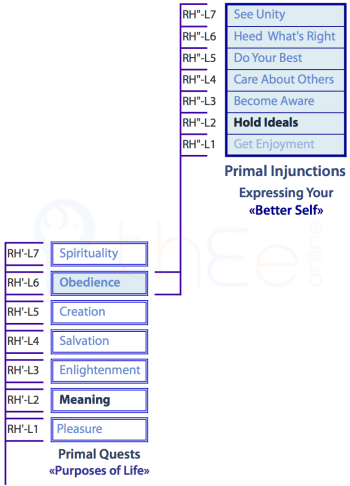Hold Ideals: RH"L2
Quest → Injunction

The Meaning Quest emphasizes the importance of being purposeful and holding values. Practical goals are selected to suit the social context and gratify the desire to do what is useful and likely to make a positive difference for others. But this cannot be widely demanded—those on the (and there are many) would reject it out of hand. The focus on values offers a better option. purposes should emerge from ideals and a to «» is reasonable for all.
If are genuinely held, they will then go on to shape your life to a greater or lesser degree. But more importantly, in social contexts, it will be evident to all that you have conceptions of goodness that are not about yourself alone. Amidst all the injustices, stupidity and brutality of social life, provide a standard and an aspiration that can point the way forward for each and all of us. Conversely, the absence of ideals can lead to dispiriting others, demoralizing groups, lowering standards when no-one is watching, and even fostering helplessness.
The requires ideals to be held genuinely and personally, not simply given lip service or adopted because they are currently fashionable. that are right for you are not just there for the taking. This requires each of us to consider ourselves and our world and seek out that make good sense.
Potential Misconceptions
are often dismissed as impractical, even distracting, and like «pie in the sky». But the to is certainly not about having your head in the clouds. It is in the nature of that they are never realized. are enduring standards for evaluating the goodness of some act or event. They are social aspirations that point to practical action. At the same time, they inhibit the reflex acceptance of harmful states simply because "it's always been this way" or "it can't be helped" or "what can one person do?"
are formed (in THEE) by a combination of the upper three types of as follows:
- an to provide a spiritual yet political force,
- appropriate to enable community relevance,
- a to give intellectual depth and strategic options.
As a result of their constitution, are debatable. An may even seem extremist because there is always a component or association. But that does not matter. Genuine intellectual battles over ideas are good.
Why Is It So Hard?
are a group phenomenon because values emerge from groups. The best situation is one where values in your workplace and local community are in accord with your . However, pressures and circumstances may mean that this is not the case or even that a conflict exists and must be tolerated.
Difficulty in may be due to the ethos of a smaller group or the wider culture. A person's temperament and philosophies may also make reference to awkward.
are not solutions: they are values embodying and concretizing goodness. So there is an inherent difficulty in the way seem so far from realization. Talking about them may seem futile or embarrassing. In societies where of any sort are unconventional, there is a realistic fear of being ridiculed. You may also be concerned that invite criticism of everyday compromises, needed as you steer your way through the rough seas of life.
- Next : become aware.
Originally posted:16-Nov-2012